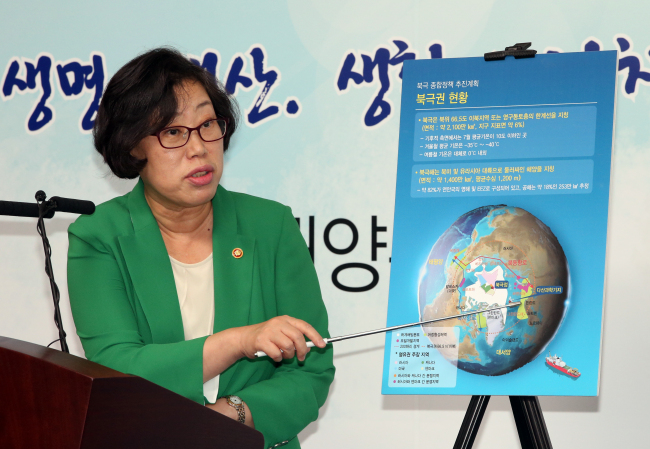The Ministry of Oceans and Fisheries unveiled on Thursday a master plan to tap economic opportunities in the Arctic, which includes developing a shipping route and natural resources in Greenland.
The ministry has pushed for development of the plan since last May when Korea won permanent observer status at the Arctic Council, the international body in charge of not only environmental protection but also economic development projects in the North Pole region.
The ministry has pushed for development of the plan since last May when Korea won permanent observer status at the Arctic Council, the international body in charge of not only environmental protection but also economic development projects in the North Pole region.

The melting of ice in the Arctic is a disaster environmentally, but it also creates new economic opportunities. In particular, it raises the possibility of developing a new, shortened marine route for the global shipping and travel industries, the ministry said.
When shippers travel to Europe via a North Pole route, their travel time allegedly could be reduced by 10 days compared to a shipping route linking Southeast Asian countries and the Suez Canal.
“The development of the North Pole region is in an infant stage, but early investors could gain more economic benefits in the long term,” Maritime Minister Yoon Jin-sook said.
As a pilot project to plow into a North Pole route, Hyundai Glovis, a leading local shipper, will deliver oil products to Korea from Europe using a North Pole shipping route next month with an icebreaking ship borrowed from Sweden, the ministry said.
On top of the investment in developing a shipping route, the ministry will also seek more MOUs with other countries, including Russia, for joint exploration of natural resources reserved in the North Pole region. The Arctic is believed to hold up to 30 percent of the world’s unidentified deposits of natural gas and about 13 percent of oil.
The government will also intensify its research efforts in the Arctic to monitor climate change and its impact on the world and the Korean Peninsula. To this end, the country will expand the size and activities of its Arctic research facility, Dasan Station, located in Ny-Alesund of Norway’s Svalbard Islands.
The ministry will also consider building its second icebreaking ship. Araon, the nation’s first-ever icebreaker, was launched in 2010.
A more detailed road map for tapping economic opportunities in the North Pole region will be released later this year, the ministry added.
By Seo Jee-yeon (jyseo@heraldcorp.com)









![[Hello India] Hyundai Motor vows to boost 'clean mobility' in India](http://res.heraldm.com/phpwas/restmb_idxmake.php?idx=644&simg=/content/image/2024/04/25/20240425050672_0.jpg&u=)








